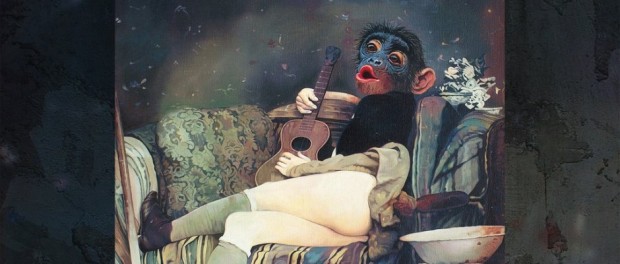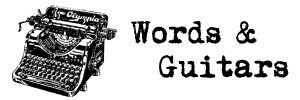In Conversation: Dumb Numbers’ Adam Harding

In August, Dumb Numbers (AKA Adam Harding And Friends) dropped their second album, II. A warm blur of genres and sounds, the album built on the expansive template of the band’s eponymously titled debut. Catching up with Harding in early October we find him already forging forward, not dwelling on the past, seeking fresh futures.
Adam Harding: I’m working now on a 12”, two really long songs with Dale (Crover) on drums, re-workings of already released songs. They were recorded last year and Thor Harris is going to play on that. Dave and I met him at a Swans show a year or two ago and got along great so I wrote to him a week ago and he’s up for that. The next full-length album I’ve been working on on-and-off since 2009 with a couple of musicians who weren’t on the first two albums – it’s going to be really different.
Words & Guitars: Things really seem to be ratcheting up for Dumb Numbers, you’re forging ahead with new things already…
AH: Well, we get together to record maybe once a year, but I’ve been writing music for so long that I have a grab-bag of songs that I can dust off. I’m not very prolific – I maybe only write a few songs a year – but I have a bunch which are old songs and I’ll write new lyrics for them. The last time I recorded was a year ago, the stuff I’m working on for the next release – that was with Dale. A year before that, I went out to Massachusetts and recorded five songs with Murph that are on the new record. Some songs develop over a really long time – usually the first thought is who would be the best drummer: “Is this a Dale song or a Murph song?” Then the bass is the next consideration after that.
It’s not really about who’s around – it’s all about what’s going to be best for the song. I’ll send stuff down to my friends Steve (Patrick) and Bonnie (Mercer) in Melbourne for what I feel they’d be best on. Sometimes I won’t know until the song is partly finished, then I might know this needs fairy dust from this person or that person to finish it up – that’s happened a few times. Or there might be a song that doesn’t need any of that: like the last song (‘Sometimes There Is No Next Time’) on the new record: that was pretty much done live, me, Dale and Kevin Rutmanis. Every song is different and that’s important to me, that ever song gets to be its own ‘thing’. So, ‘Sometimes There Is No Next Time’ felt like it should be this repeating thing and as long as it needs to be – while ‘Will You Earn a Star?’, which is actually a song I wrote instrumentally back in the nineties, that was always going to be a two-and-a-half minute song.
W&G: I remember buying Dumb Numbers’ first album, loved it, there are similarities to II but they seem quite distinctive – is that a deliberate development?
AH: The first record was really pulling stuff from a variety of sessions over the years while II was more conceived in terms of which eight songs were going to be on the record. II didn’t take long, it was all pretty much done in about a year – but some of the songs are really old. I’ve got ideas for five records: obviously you’re living a life and you don’t know what’s going to happen tomorrow, but I have ideas for what I want to do out to five records. I think it’s good to never look back too much, to always be onto the next thing.
When I’m making a record I’m listening to it over and over and over again – so by the time it’s out, I never want to hear it again. And it takes so long, especially with vinyl, it can be six months even to get a test pressing. By the time other people can buy the record you’ve already moved onto other things. I don’t mind talking about it but I sure don’t want to hear it!
W&G: One of the most distinctive characteristics in terms of your music is often there’s this layering of voices, like a choir singing harmonies…
AH: I was born into a cult, a crazy, fundamentalist, pentacostalist cult – that’s a whole other story. I think I was inspired by being surrounded by a thousand people all singing – and some of them had really amazing voices while others had terrible voices. But when you have that many voices singing at the same time it creates this feeling and I think I’ve been chasing that feeling – not of being in a cult, but the singing, it was really powerful. It was also kinda creepy, sometimes it’d be a thousand people speaking in tongues at the same time. It becomes like a wind. But when people are singing hymns and stuff like that it was really something else. I don’t think I would ever print a lyrics sheet; I write about some of those experiences, but for me I’m not trying to be understood – it’s just a need to get those things out.
W&G: That’s quite a background – so where did all of this start for you? Musically I mean.
AH: I’ve loved music as long as I can remember: my earliest memories are of listening to The Beatles. But I don’t think I ever would have started recording if I hadn’t heard Sebadoh and got this feeling – not that I can do it the way they did it, or as good – but that this was made by real people and it was incredibly inspiring. I got a four track and from ‘94 just started making what were probably embarrassingly derivative songs but you’ve got to work through that stuff – at least I did. I made a couple of cassettes and sent them to Lou Barlow – I got a bit of encouragement that kept me going and, from then, I never stopped making music.
I moved to Los Angeles in 2003 – I’ve been here 13 years and it’s been great. I don’t think any of this would have happened if I’d stayed in Australia. I got a job at a DVD production firm doing audio-mixing and video-editing – it’s where I learned those things. We were working on the Cry Baby DVD, a director’s cut so it had a lot of deleted scenes added back in. There was a scene with a young contortionist and nobody could remember what the original music was – they had it, but no one could identify it, so they couldn’t get the rights. So they asked me if I could do something. Being able to say to Lou “Hey, would you want to help me do some music for John Waters?” That gave me the confidence to ask him to play with me. Maybe Dumb Numbers wouldn’t have happened otherwise.
W&G: I still love the cover you did of Kurt Cobain’s ‘Do Re Mi’ under your own name – when did Dumb Numbers arise?
AH: Well, Dumb Numbers, really, is me. It became the name for what I’m doing and with each release it’s grown, pulling more people in. When I signed to Joyful Noise, I’d been thinking for a year about having a band name. We opened a few shows for Sebadoh in Melbourne in 2011 billed as ‘Adam Harding And Friends’ and I felt a bit goofy about that, it felt a little weird to me. Karl, who runs Joyful Noise, asked if I’d thought about using more of a band name – so then it was a matter of finding a name, it was really hard. I actually asked David Lynch for advice and he gave me this elaborate thing: “OK, take five girls’ names, seven animal names,” this is not exactly what he said, I wrote it all down on a tissue box at the time. “Put all of those names down on paper and pull them out of a hat.” I tried that but only came up with one name – and it was already taken. So I asked Lou and he suggest Dumb Numbers based on something his daughter had said. That seemed to be ambiguous enough to work – and it has.
W&G: It’s quite a life you’ve led, growing up in a cult, Australia, LA, your video and music work, friends with Lou Barlow, David Yow, David Lynch – what gives you this momentum and keeps you moving forward?
AH: I’m getting older and I don’t have kids, so I just want to create things all the time. I love doing it and I am really lucky to have talented and creative friends – like my friendship with David Yow which was born out of making a video together and having so much fun doing it, out of all my friends I probably spend the most time with David because it’s so much fun hanging out with him and also so productive.
I’m also totally inspired by David Lynch’s work ethic: he’s creating every single day: right now he’s working on Twin Peaks but another day he could be building furniture, making music, painting, taking photos. A day not creating is a day wasted. You have to make sacrifices in your life and I made music and video the priority and put that above relationships, or finances, because ultimately it gives me a sense of purpose. Even though I’ve been writing songs a long time, I think something changed in me around the time Dumb Numbers started, I made it the focus of my life.
II is out now via Joyful Noise.




